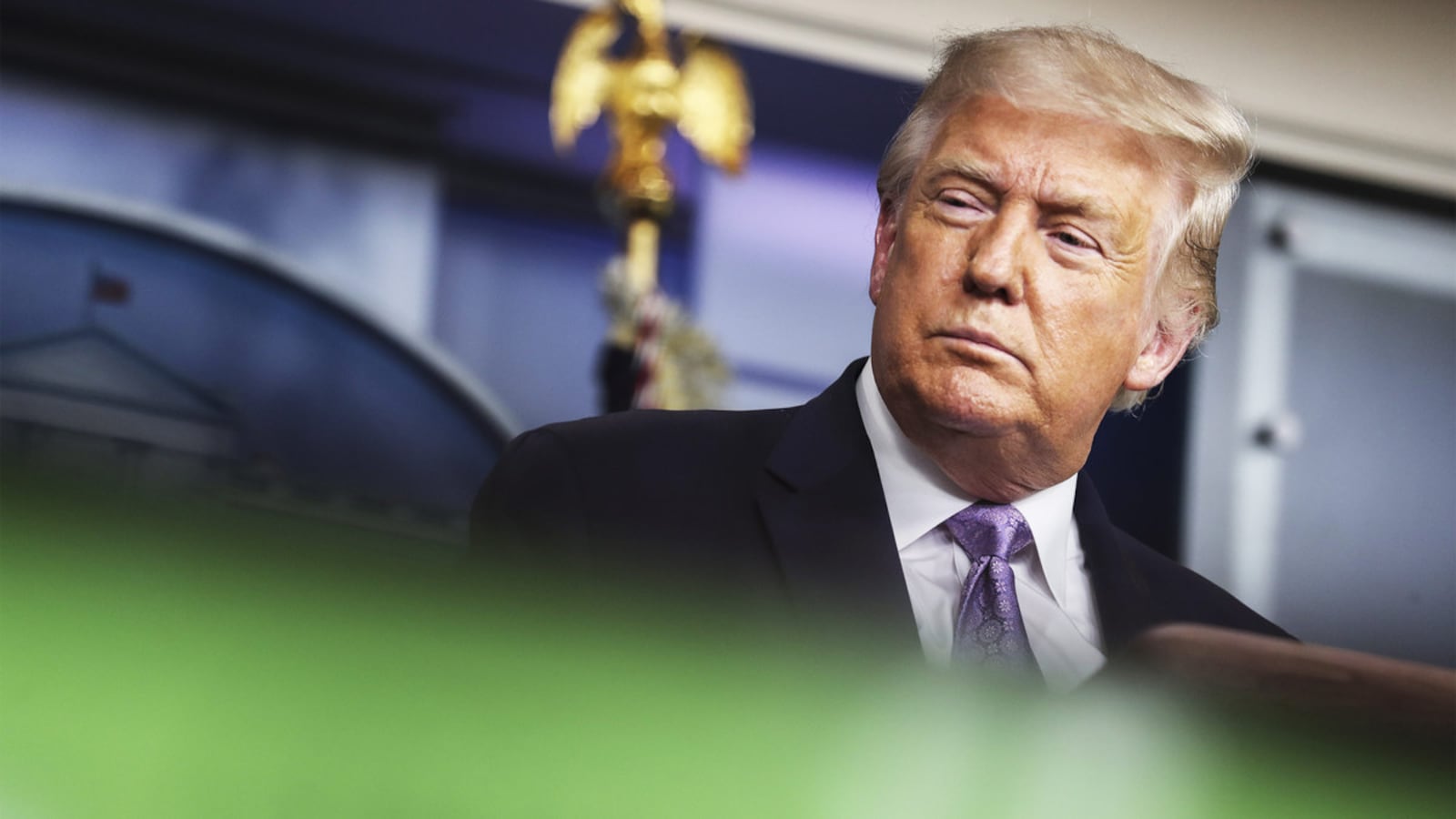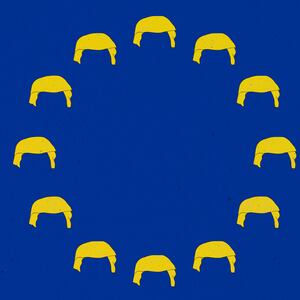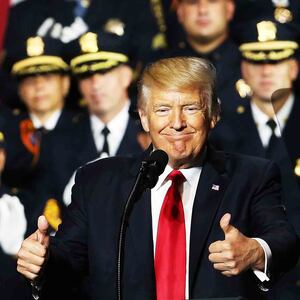President Donald Trump has repeatedly struggled to outline what his second-term policy agenda might look like. But last week he finally offered one specific policy he hopes to put in place if he’s re-elected: a cut to the capital gains tax rate.
It was the only specific second-term policy goal the president mentioned during an interview with Fox’s Maria Bartiromo. And though cutting tax rates on wealthy investors is a longtime mainstay of Republican tax policy, for even some of Trump’s own defenders the proposal was yet another illustration of a key shortcoming of his re-election bid.
The billionaire who branded himself so effectively as a populist in 2016 has largely abandoned that approach.
“So much of what made Trump 2016 so populist—immigration, for instance—is absent from 2020 messaging now because of the virus,” said a Republican close to the Trump campaign. “It is different because the priorities are so radically different this time around, with the current crisis.”
Those who were with Trump in 2016 say the differences between then and now are significant. During his 2016 run, Trump had decried the “hedge fund people” for paying so little in taxes. In 2020, that patina is gone, supplanted by a heavier focus on a capital gains tax cut.
But the contrasts extend beyond tax policy. A candidate who railed against trade deals and foreign wars, while promising to protect entitlement programs and restore manufacturing, now seems preoccupied with the stock market, how beloved he is by Americans who can afford “beautiful” boats, and how he’ll protect wealthy suburbanites and their “housewives” from the unwashed masses trying to overrun their neighborhoods.
Blame for that is cast, in part, on the team that the president has surrounded himself with—a group of long-standing free market economic types and conservative ideologues. But sources working on and close to the campaign say that the problem is also contextual. A GOP campaign aide conceded that Trump has had difficulty hitting the same populist themes that animated his 2016 run, but not for a lack of effort.
“We’ve been pushing the stuff,” the aide said. “If he was out giving campaign speeches multiple times every week there would be opportunities to do that. A lot of the remarks he is giving every week are COVID press briefings. Or he’s visiting a place making PPE. It’s all been related to the pandemic.”
Two people working on Trump’s re-election effort told The Daily Beast that they have directly implored the president in recent weeks to pivot back to the kind of populism that won him the presidency the first time. The advice seems to be falling on deaf ears, with one of the sources saying the president responded by saying he’s already doing a lot of it.
But Trump has created his own problems too. Having run on a pledge to “drain the swamp,” he’s turned around and hired prominent lobbyists for key administration positions. The Trump campaign website devoted to the promises the president has kept contains a page hyping his efforts at “making government accountable.” But its list of “recent achievements” ends in 2018, with the confirmation of Supreme Court Justice Brett Kavanaugh.
More recently, Trump has pursued policies like unilaterally delaying the collection of payroll taxes, which has opened him up to charges of endangering Social Security funding. And his messaging on this front has been confusing, at best. “Sleepy Joe Biden and the rest of the radical democrats will DESTROY Social Security. America would turn into a Big Government Socialist Nation,” read one of the hundreds of identical Facebook ads that the campaign has run on the entitlement program.
Even the structure of the president’s re-election effort has taken away from the populist brand he has often sought. In 2016, the campaign relied in large measure on the tens of millions of dollars Trump gave his own campaign—financial support that, Trump insisted, would insulate him from the special interests accustomed to buying favor with political candidates. Since he was elected, Trump has not written a single cheque to his re-election effort. His grassroots donors have made up much of the difference. But his party’s top money men and women have also stepped up. Roughly 100 more people gave the legal maximum to the Trump campaign from 2019 through the end of June than did so throughout the entire 2016 presidential cycle, campaign finance records show.
The president’s aides say the plan is to make a big push to hit populist notes in the closing months of the election. “The forgotten men and women of America” is the theme of Republicans’ presidential nominating convention next week. The campaign recently began airing television ads hammering pharmaceutical companies over high drug prices. And on Monday, the campaign released a web video accusing Biden of killing U.S. jobs through his support for the North American Free Trade Agreement.
“For over three years, President Trump has worked tirelessly for the forgotten men and women of America by creating jobs, cutting taxes, renegotiating trade deals, lifting millions out of poverty—essentially undoing the damage his predecessors inflicted on our country for eight years,” said Samantha Zager, the White House’s deputy national press secretary. “With Joe Biden and Kamala Harris embracing socialism to appease their radical base and curry favor with Hollywood celebrities, it’s clear Democrats are once again leaving the American people behind. Biden and Harris want to help themselves, President Trump wants results—for everyone.”
Going forward, the campaign is gearing up to attack Biden and his running mate, Sen. Kamala Harris (D-CA), for being too close to multinational corporations, including tech giants. And they are also planning a more aggressive assault on Biden for allegedly using his office to enrich his family.
But those charges have been made already and have yet to truly stick. Indeed, earlier in the campaign, Team Trump aggressively tried to paint Biden and his family as hideously corrupt, as they had with Hillary Clinton four years ago. Trump’s effort on this was so hard-charging and scandalous that it actually ended up getting him impeached. More recently, the messaging that Biden helped orchestrate an international ring of self-dealing has taken a backseat to accusations that he is too senile to know where he is. The “Crooked Hillary” moniker that worked well in ‘16 has become an ineffectual “Slow Joe.”
“There is not a 20-plus year history of an aura of corruption,” one Democratic campaign source said of the inability of Trump to hammer Biden like he did Clinton. “She had, unfairly, been a target and victim of this kind of thing for a very long time... People know Joe Biden. You can’t paint him with a broad brush like that.”
GOP operatives working to re-elect Trump argue that he’s still a conservative populist—it’s just that the messaging priorities have shifted. Ed Rollins, a longtime Republican strategist who fronts the pro-Trump group Great America PAC, said that though there’s a “gigantic difference” between the two campaigns, he contended that the president has been “very populist” in his “law and order” message and in asking voters to make the choice between policies that would “benefit the thugs in the streets, as opposed to the cops in the precincts.”
“Obviously, if the virus hadn’t occurred, and the economy were still booming, this would be a fairly easy election for the president,” Rollins continued. “But clearly this has been a struggle."
While some in the party have praised Trump’s response to the pandemic, others have seen missed opportunities for him to adopt the populist approach that worked well for him four years ago. After the collapse of coronavirus-relief negotiations on Capitol Hill, Trump sided with his more traditionally conservative advisers, bucking his own big-spending impulses and eschewing an ambitious stimulus during a massive economic crisis. Over the weekend, he stated that the economic situation was fine enough currently to not necessitate any more help from the feds.
Tim Miller, a NeverTrumper who worked for Jeb Bush’s campaign as its communications director, said he was “mystified” as to why Trump had “not gone full populist,” in large part because he used it so effectively to dismantle Bush and others in the ‘16 primary.
“I think he had a big opportunity to say Mr. Trump is going to provide a goody bag for everybody until we get out of [the COVID pandemic],” said Miller. “He had no background in the ideological, free market, Larry Kudlow wing of the party. And yet he seems like he’s tying himself to it at the worst time possible.”










